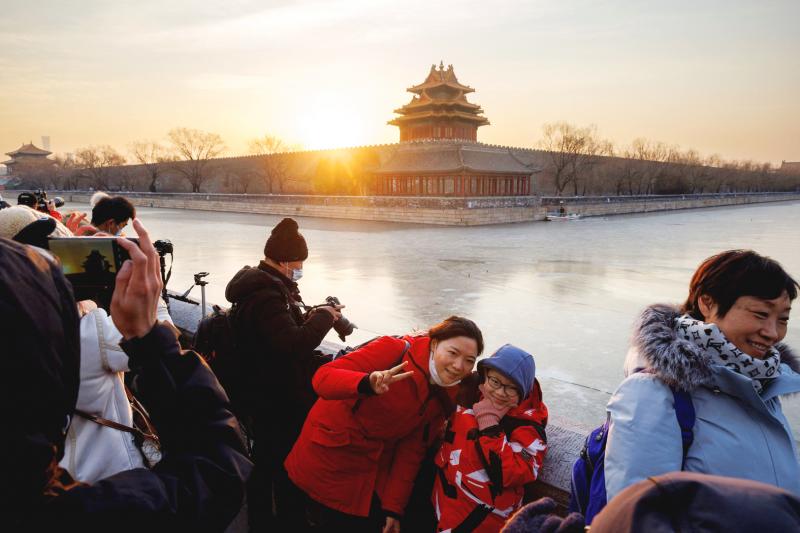China ended its final week of last year with its biggest tally of local COVID-19 cases for any seven-day period since subduing the country’s first epidemic nearly two years ago, despite an arsenal of some of the world’s toughest restrictions.
The Chinese National Health Commission yesterday reported 175 new community infections with confirmed clinical symptoms for Friday, bringing the total number of local symptomatic cases in the nation in the past week to 1,151.
The surge has been driven mostly by an outbreak in the northwestern industrial and tech hub of Xian, a city of 13 million people.

Photo: Reuters
The deepening outbreak in Xian is likely to bolster authorities’ resolve to curb transmissions quickly as and when cases emerge.
The city, under lockdown for 10 days as of yesterday, has reported 1,451 local symptomatic cases since Dec. 9, the highest tally for any Chinese city last year.
While China’s case count is tiny compared with many outbreaks elsewhere in the world, forestalling major flare-ups this year will be important.
Beijing is to host the Winter Olympic Games next month and the Chinese Communist Party is to hold a once-every-five-years congress, expected in the fall, at which Chinese President Xi Jinping (習近平) is likely to secure a third term as party secretary.
The emergence of the highly transmissible Omicron variant of SARS-CoV-2 will also drive Beijing to stick to its high vigilance against the virus.
China has reported a handful of imported Omicron cases and at least one locally transmitted case.
Since August, China has tried to get any outbreak under control within about two weeks, much shorter than the four to six weeks in earlier battles against sporadic flare-ups following the initial nationwide epidemic, the health commission said.
Cities along China’s borders are at higher virus risk, either due to the presence of overland transport links or entry of infected travelers from other countries.
Some were hit by Delta outbreaks that resulted in harsh travel curbs last year.
Yunnan, which shares a border with Myanmar, Laos and Vietnam, reported new local symptomatic cases on 92 out of 365 days last year, or 25 percent of the time, more often than any other province, autonomous region or municipality.
The Xian outbreak, which led to cases in other cities, including Beijing, could be traced back to a flight arriving from Pakistan, but it was unclear how it spread to local communities.
Many people have been forbidden from leaving their residential compounds, but a city government official on Friday said that curbs would be loosened in less risky compounds when the time was right.
Postgraduate student Li Jiaxin, 23, said that nobody can leave the campus of her university.
She spent New Year’s Eve with her three roommates and was unable to meet with her boyfriend and family.
“I might be what you would consider a person with a strong sense of ritual, so I still feel a little sad that we are not together at this time,” Li said.
China’s tough epidemic policies have helped stop its sprawling industrial sector from sliding into prolonged shutdowns, reaping important export gains as other pillars of growth weakened.
However, unpredictable disruptions have shaken consumer sentiment and hammered the catering, hospitality and tourism sectors.
An employee surnamed Wang at a traditional teahouse in Kunming, the capital of Yunnan, said that her company’s revenues had been halved compared with pre-pandemic levels.
“Many guests from other provinces had came to our teahouse specially for a taste of Yunnan’s Puer tea, but now there are fewer of them,” Wang said.
“My salary hasn’t been cut, but I feel I may lose my job at any time,” she said.

DISASTER: The Bangladesh Meteorological Department recorded a magnitude 5.7 and tremors reached as far as Kolkata, India, more than 300km away from the epicenter A powerful earthquake struck Bangladesh yesterday outside the crowded capital, Dhaka, killing at least five people and injuring about a hundred, the government said. The magnitude 5.5 quake struck at 10:38am near Narsingdi, Bangladesh, about 33km from Dhaka, the US Geological Survey (USGS) said. The earthquake sparked fear and chaos with many in the Muslim-majority nation of 170 million people at home on their day off. AFP reporters in Dhaka said they saw people weeping in the streets while others appeared shocked. Bangladesh Interim Leader Muhammad Yunus expressed his “deep shock and sorrow over the news of casualties in various districts.” At least five people,

LEFT AND RIGHT: Battling anti-incumbent, anticommunist sentiment, Jeanette Jara had a precarious lead over far-right Jose Antonio Kast as they look to the Dec. 14 run Leftist candidate Jeannette Jara and far-right leader Jose Antonio Kast are to go head-to-head in Chile’s presidential runoff after topping Sunday’s first round of voting in an election dominated by fears of violent crime. With 99 percent of the results counted, Jara, a 51-year-old communist running on behalf of an eight-party coalition, won 26.85 percent, compared with 23.93 percent for Kast, the Servel electoral service said. The election was dominated by deep concern over a surge in murders, kidnappings and extortion widely blamed on foreign crime gangs. Kast, 59, has vowed to build walls, fences and trenches along Chile’s border with Bolivia to

DEATH SENTENCE: The ousted leader said she was willing to attend a fresh trial outside Bangladesh where the ruling would not be a ‘foregone conclusion’ Bangladesh’s fugitive former prime minister Sheikh Hasina yesterday called the guilty verdict and death sentence in her crimes against humanity trial “biased and politically motivated.” Hasina, 78, defied court orders that she return from India to attend her trial about whether she ordered a deadly crackdown against the student-led uprising that ousted her. She was found guilty and sentenced to death earlier yesterday. “The verdicts announced against me have been made by a rigged tribunal established and presided over by an unelected government with no democratic mandate,” Hasina said in a statement issued from hiding in India. “They are biased and politically motivated,” she

It is one of the world’s most famous unsolved codes whose answer could sell for a fortune — but two US friends say they have already found the secret hidden by Kryptos. The S-shaped copper sculpture has baffled cryptography enthusiasts since its 1990 installation on the grounds of the CIA headquarters in Virginia, with three of its four messages deciphered so far. Yet K4, the final passage, has kept codebreakers scratching their heads. Sculptor Jim Sanborn, 80, has been so overwhelmed by guesses that he started charging US$50 for each response. Sanborn in August announced he would auction the 97-character solution to K4